外研版必修三Module 5 Great People and Great Inventions of Ancient China Language points 课件(61张ppt)
文档属性
| 名称 | 外研版必修三Module 5 Great People and Great Inventions of Ancient China Language points 课件(61张ppt) | 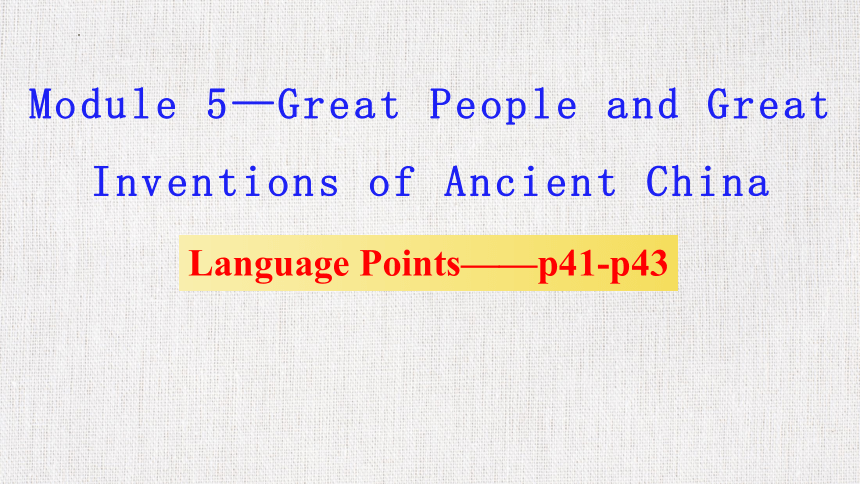 | |
| 格式 | pptx | ||
| 文件大小 | 22.3MB | ||
| 资源类型 | 教案 | ||
| 版本资源 | 外研版 | ||
| 科目 | 英语 | ||
| 更新时间 | 2023-01-28 19:11:17 | ||
图片预览

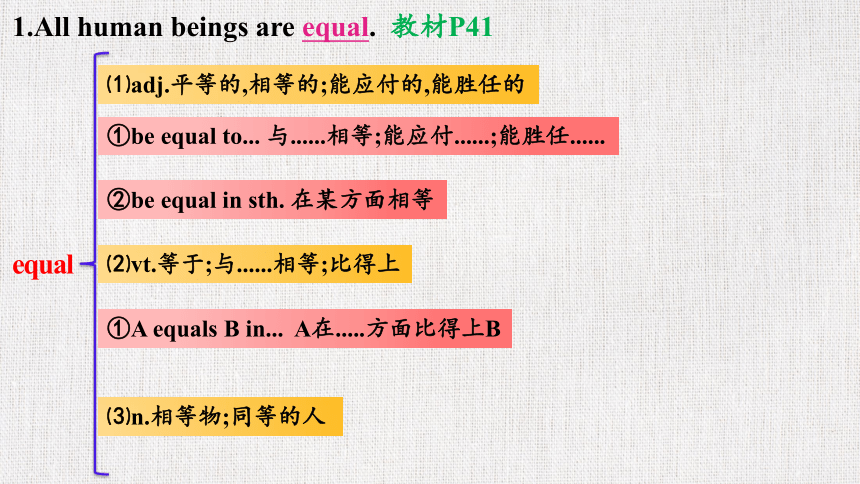


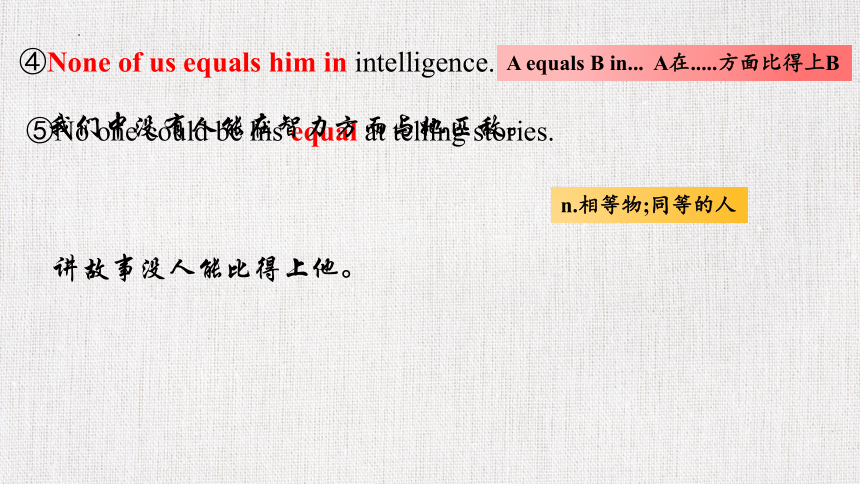
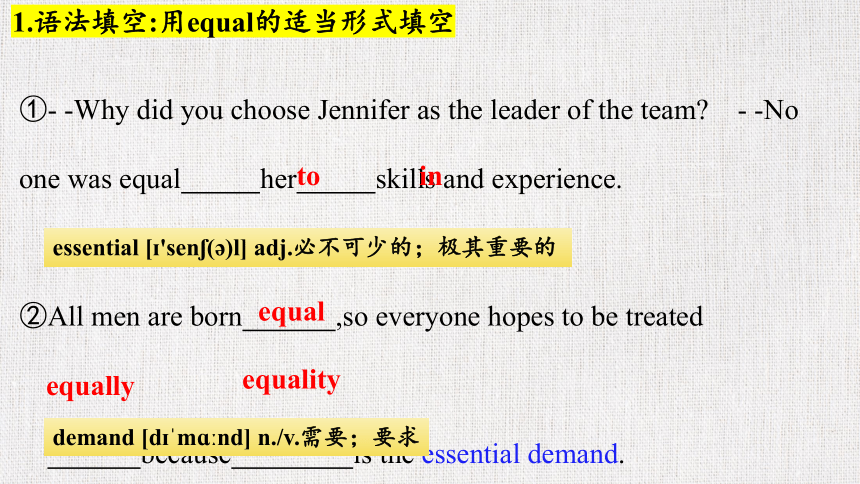

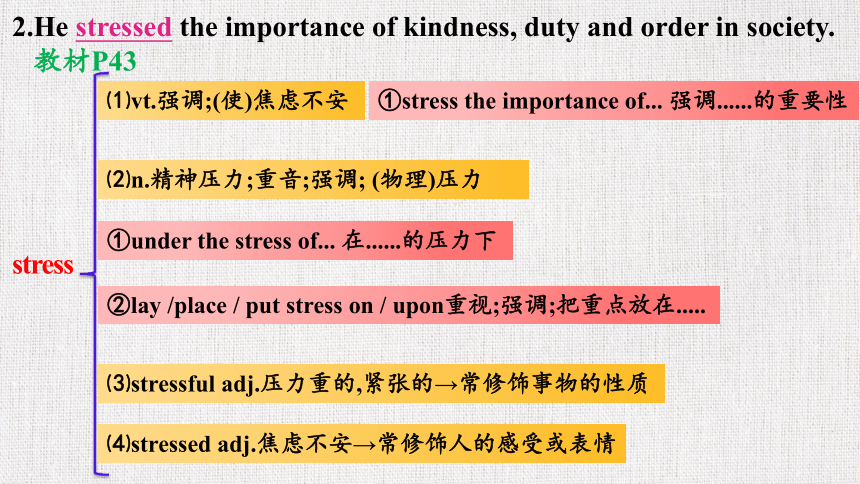
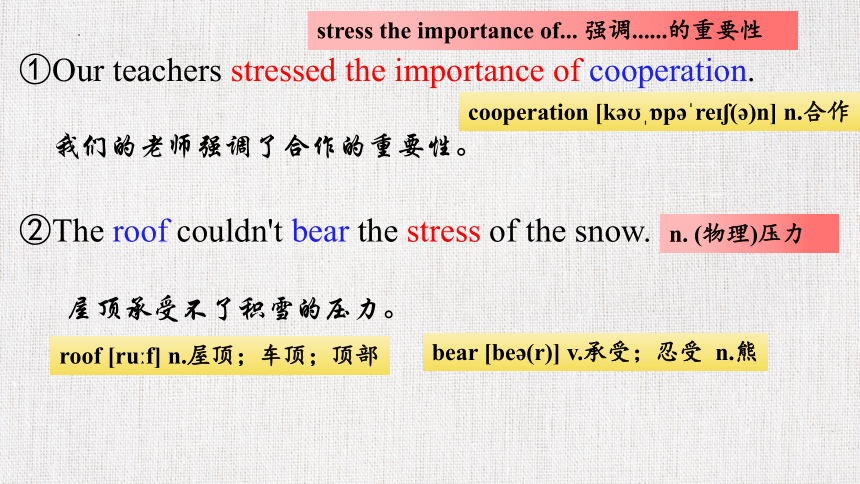
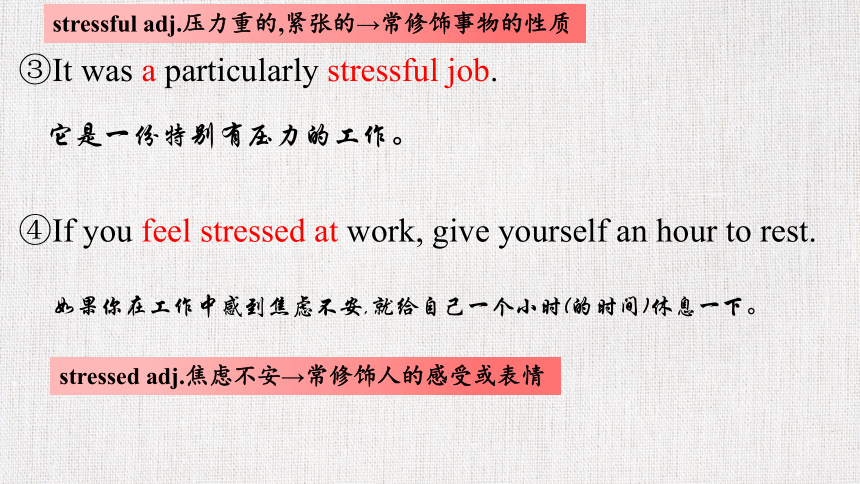
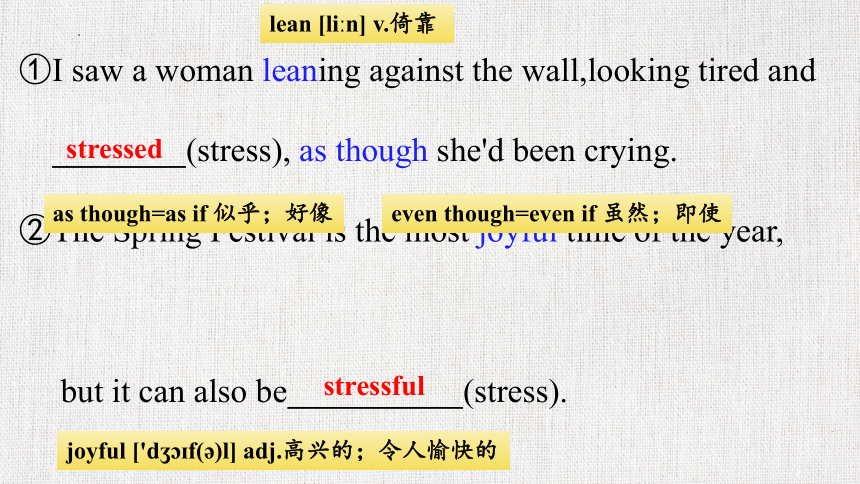
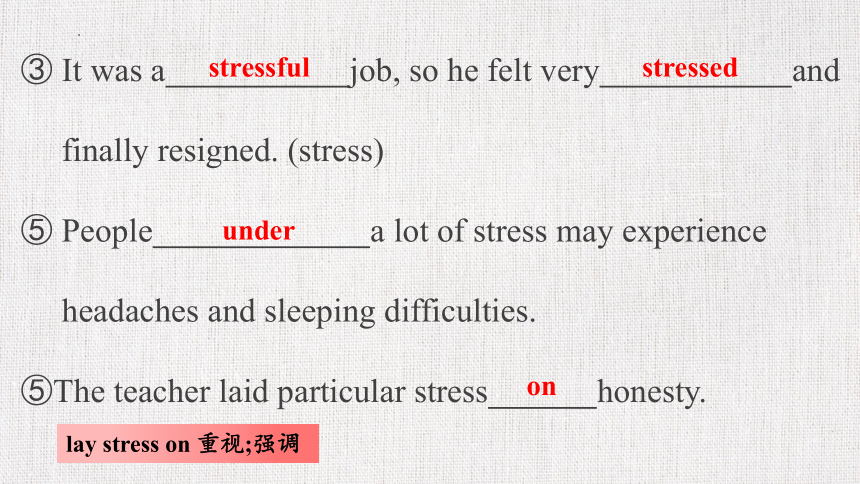
文档简介
(共61张PPT)
Module 5—Great People and Great Inventions of Ancient China
Language Points——p41-p43
equal
1.All human beings are equal. 教材P41
⑶n.相等物;同等的人
⑴adj.平等的,相等的;能应付的,能胜任的
①be equal to... 与......相等;能应付......;能胜任......
②be equal in sth. 在某方面相等
⑵vt.等于;与......相等;比得上
①A equals B in... A在.....方面比得上B
equal派生词
⑴unequal adj.不相等的;不平等的
⑶equality n.平等;相等
⑵equally adv.平等地;同样地
①Bill is equal to the challenge.
②Not all men are equal in ability.
③Four plus four equals eight.
比尔能应付这个挑战。
并非所有人在能力方面是相等的。
四加四等于八。
be equal to... 能应付......
be equal in sth. 在某方面相等
vt.等于
④None of us equals him in intelligence.
⑤No one could be his equal at telling stories.
我们中没有人能在智力方而与她匹敌。
讲故事没人能比得上他。
A equals B in... A在.....方面比得上B
n.相等物;同等的人
①- -Why did you choose Jennifer as the leader of the team - -No one was equal her skills and experience.
②All men are born ,so everyone hopes to be treated
because is the essential demand.
1.语法填空:用equal的适当形式填空
to
in
equal
equally
equality
essential [ 'sen ( )l] adj.必不可少的;极其重要的
demand [d mɑ nd] n./v.需要;要求
③The rent was equal________ half of his monthly income.
to
rent [rent] n.租金 v.租用
monthly ['m nθli] adj.每月的 adv.每个月
2.He stressed the importance of kindness, duty and order in society.
教材P43
①stress the importance of... 强调......的重要性
①under the stress of... 在......的压力下
stress
⑴vt.强调;(使)焦虑不安
⑵n.精神压力;重音;强调; (物理)压力
⑶stressful adj.压力重的,紧张的→常修饰事物的性质
⑷stressed adj.焦虑不安→常修饰人的感受或表情
②lay /place / put stress on / upon重视;强调;把重点放在.....
①Our teachers stressed the importance of cooperation.
②The roof couldn't bear the stress of the snow.
我们的老师强调了合作的重要性。
屋顶承受不了积雪的压力。
stress the importance of... 强调......的重要性
cooperation [k p re ( )n] n.合作
n. (物理)压力
roof [ru f] n.屋顶;车顶;顶部
bear [be (r)] v.承受;忍受 n.熊
③It was a particularly stressful job.
④If you feel stressed at work, give yourself an hour to rest.
它是一份特别有压力的工作。
如果你在工作中感到焦虑不安,就给自己一个小时(的时间)休息一下。
stressful adj.压力重的,紧张的→常修饰事物的性质
stressed adj.焦虑不安→常修饰人的感受或表情
①I saw a woman leaning against the wall,looking tired and
(stress), as though she'd been crying.
②The Spring Festival is the most joyful time of the year,
but it can also be (stress).
stressed
stressful
lean [li n] v.倚靠
as though=as if 似乎;好像
even though=even if 虽然;即使
joyful ['d f( )l] adj.高兴的;令人愉快的
③ It was a job, so he felt very and
finally resigned. (stress)
⑤ People a lot of stress may experience
headaches and sleeping difficulties.
⑤The teacher laid particular stress honesty.
stressful
stressed
under
on
lay stress on 重视;强调
3.He stressed the importance of kindness, duty and order in society.
教材P43
①You should keep the files in good order.
②After the experiment , everything is put in order in the glass cabinet.
③The car was out of order, so we had to walk to school.
你应当把文件井然有序地排列。
实验后,一切东西都有序地摆放在玻璃柜中。
汽车出了故障,所以我们只好步行去上学。
file [fa l] n.档案;文件
cabinet ['k b n t] n.储藏柜
in good order 井然有序
put sth. in order 把某事安排妥当
out of order 出毛病
④The boss ordered that the work (should) be done on time.
⑤The general ordered them to advance.
⑥They are said to have ordered lots of grain from Canada.
老板要求工作应该按时完成。
将军命令他们前进。
据说他们从加拿大订购了许多谷物。
order + that从句→从句谓语用" should +动词原形" , should可省略
vt.命令
vt.订购
grain [ɡre n] n.谷物
①He had to obey the order that he must finish the secret task ahead of time.
2.单句语法填空①After the hurricane, everything in the room is of order.②The coach ordered us (wear) helmets when we cycled.
1.单句改错
out
to wear
out of order 不整洁;次序颠倒
order sb. to do sth.命令某人做某事
coach [k t ] n.长途汽车;教练
helmet [ helm t] n.头盔
③ (order) over a week ago, the books are expected to arrive
any time now.
④He ordered that his men (put) down their weapons.
Ordered
(should) put
order + that从句→从句谓语用" should +动词原形" , should可省略
weapon ['wep n] n.武器
⑶呕吐
4.His father died when he was young, and he was brought up by his
mother. 教材P43
bring up
⑴抚养;养育(常用被动语态)
①be brought up to do sth 从小被教导做某事
⑵提出
①He was brought up by his uncle.
②Though born and brought up in the city ,she prefers life in the county.
他是由叔叔抚养大的。
尽管在城市出生和长大,但她更喜欢农村的生活。
抚养;养育(常用被动语态)
③Why don' you bring this question up at the meeting this afternoon
④He was so dunk that he brought up his lunch.
今天下午在会上你为什么不提出这个问题
他喝得酩酊大醉,把午饭都吐了出来。
提出
呕吐
bring构成的其他短语:
①bring about
②bring forward
③bring in
④bring out
⑤bring back
引起;导致
提议;将.....提前
引进;提出(新法案)
使显现;使表现出
恢复;把......送回,归还;使回忆起
“v +up”型短语:
①add up
②look up
③pick up
④build up
⑤take up
⑥turn up
⑦cut up
⑧cheer up
⑨dress up
⑩give up
hold up
加起来
查找;查阅
拾起;搭载;学会
增强
占据;开始从事
出现;开大
切碎
(使)高兴起来
装扮;穿上盛装
放弃;戒除
支撑;耽搁
①She was brought_____ in a happy home environment.
②Her carelessness brought the terrifying accident.
③Born into a family with three brothers, David was brought_____to
value the sense of sharing.
练习题:
up
about
up
bring up 抚养;养育
bring about 引起;导致
bring up 抚养;养育
①Don't worry about me——I can look after myself well.
5.Mozi taught that we should love all human beings and look after
those who are weaker than ourselves. 教材P43
look after 照顾;照料
别担心我——我能照顾好自己。
①look out
②look up
③look back
④look down on/upon
⑤look for
⑥look over
look构成的其他短语:
留神;当心
查阅
回顾
轻视;瞧不起
寻找
查看;检查
⑦look through
⑧look up to
⑨look on
⑩look ahead
look around/round
look into
look forward to (doing) sth.
快速查看;浏览
尊敬
旁观
展望未来
环顾;四下察看
调查;审查
盼望/期待(做)某事
⑴本句中的the way表示“......的方式”,后面接 从句。⑵The way在定语从句中作状语时,关系词用 (可以省略)。I don't like the way in which he laughed at me.
=I don't like the way that he laughed at me.
= I don't like the way he laughed at me.
我不喜欢他用那种方式来嘲笑我。
6.句子分析1:Treat others in the way you want to be treated.
教材P41
定语
that / in which
⑴"that/which I don't like" 为定语从句,先行词为the way,其逻辑语序应为I
don't like the way。关系词代指先行词the way,在从句中作宾语,故用that或
which都可以。又因为关系词是从句的宾语,因此也可省略,即下面的三种
表达方式都是正确的:①You speak to her in the way which I don't like.②You speak to her in the way that I don't like.③You speak to her in the way I don't like.
★★注意:
You speak to her in the way that/which I don't like.
练习题:①The way you look at the problem is wrong.
②This is the way I do such things.③Please do the experiment in the way I have shown you.④This is the way helps me.
⑤This is the way he told me.⑥I don' t like the way he looks at me.
⑦The way he explained to us was quite simple.
that / in which
that / in which
that/which
that/which
that/which
that / in which
that/which
⑴句中“the reason why... is that...”意为 。 ⑵why引导的是 从句,that引导的是 从句。
7.Mencius believed that the reason why man is different from
animals is that man is good. 教材P43
......的原因是......
定语
表语
★★注意:
⑴the reason后定语从句的引导词用why/ for which还是用that/which,取决于其
在定语从句中所承担的句子成分。
⑵缺少主语、宾语、表语→用that 或which;缺少状语→用why或for which。
①The reason ________ he was late was that his car broke down on the way.②Tom’s boss didn’t believe his reason he gave for his being late again.③The reason he failed the English exam was he didn't learn it well.④ The reason he explained to me about his failure was that he hadn't
made full preparations.
that/which
why
that
why
that/which
⑶the reason for sth
⑷the reason for doing sth
⑸The reason for sth is/was that...
⑹The reason for doing sth is/was that...
⑺That/This is because...
⑻That/This is why...
某事的原因
做某事的原因
某事的原因是.....
做某事的原因是.....
这是因为...... → 表语从句表示原因
这就是......的原因 →表语从句表示结果
⑤When asked about the reason winning the competition, he owed
his success to his mother.
⑥Sorry, we are late. That's we were held up in the traffic jam.
⑦We were held up in the traffic jam and that's we are late.
for
because
why
the reason for doing sth 做某事的原因
That/This is because... 这是因为......
That/This is because... 这就是......的原因
Module 5—Great People and Great Inventions of Ancient China
Language Points——p44-p49
⑴become interested in... = be interested in... = take an interest in... 对......感兴趣
8.This was a period when many people became interested in
Confucius's teachings. 教材P45
⑶lose interest in... 对......失去兴趣
⑵develop an interest in... 培养对......的兴趣
①Traveling along the old Silk Road is an (interest) and
rewarding (有益的) experience.②At first, she developed a great interest painting, but got
tired of it soon.③In their spare time, they are (interest) in planting
vegetables in their garden, which is on the rooftop of their house.
interesting
in
interested
1.语法填空
①你什么时候开始对弹钢琴产生兴趣了
2.完成句子
When did you become interested in playing the piano
9.a sense of responsibility 教材P45
① a sense, his teachings are influential in the field of philosophy.
②I (sense) that the representative didn't like the idea.
③There is no sense buying expensive clothes for children, as
they soon grow out of them.
1.语法填空
In
sensed
in
in a sense从某种意义上说
vt.感觉到;意识到
There is no sense in (doing) sth. (做)某事没有道理
10.a sense of responsibility 教材P45
①Not only is likability related to positive life outcomes,but it is
also responsible those outcomes, too.
②Mr Green is always devoted to his work and has a sense of
(responsible).
1.语法填空
for
responsibility
be responsible for sth. 对......负责;有责任
a sense of responsibility 责任感
③While it is natural for us to be curious, it is also our responsibility
(respect) others' secrets.
④They have responsibility ensuring that the plans are carried out.
⑤It's the police's (responsible ) to protect the safety of
the travellers.
It is one's responsibility to do sth. 某人有责任做某事
have responsibility for (doing)sth 有(做)某事的责任
responsibility n.责任;职责;义务
for
to respect
responsibility
11.respect 教材P45
①The students show great respect their English teacher.
② this respect the new version is not so good as the old one.
1.语法填空
have/show respect for... 对......表示尊敬/尊重
in this/that respect在这/那方面
for
In
③In my opinion, most doctors are , so we should be
to them. (respect)
④Please send my ( respect) to your parents when you write.
1.语法填空
respectable adj.体面的;值得尊敬的
respectful adj.表示敬意的;尊敬的
respectful
respectable
send one's respects to... 代某人向......问候
respects
12.contribution 教材P46
①Kate was praised by the teacher for she had made an excellent
(contribute) to group discussion.
②What he did last year has contributed to (encourage)
foreign investment in China.
1.语法填空
make a contribution/contributions to 对......做贡献;为......捐款
contribute to 对......做贡献;为......捐款;促成;造成
contribution
encouraging
③There is evidence that drinking water after getting up in the morning
contributes one's health.
④Eating too much fat can contribute heart disease and
cause high blood pressure.
1.语法填空
contribute to 促成
contribute to 造成
to
to
13.He is a man who(m) China can be proud of. 教材P47
①When he grows up, he is so successful that he takes pride his
hard work.②She is proud (take) part in competitions and to have
broken a record.
1.语法填空
in
to take
take pride in 为.....感到骄傲
be proud to do sth. 为做......而自豪
③Linda felt a great sense of she watched her husband receive
the award. And her husband said he was very to have been
involved in the project. ( proud)
④Janet's performance at school is well above average. Her parents are
proud her.
pride
proud
of
pride n.骄傲;得意感
be proud to do sth. 为做......而自豪
be proud of 为.....感到骄傲
14.In conclusion, I think that cars are very useful because travel is
so easy with a car. 教材P48
①He based his ( conclude) on the evidence given by the
eyewitness.② conclusion, I'd like to thank you for what you've done for me.
1.语法填空
conclusion n.结束;结论
in conclusion 总之;最后
conclusion
In
③I soon came the conclusion that she was lying.
④Why do you jump to conclusion that I did it
come to a conclusion 得出结论
jump to the conclusion that... 匆忙下......结论
to
the
15.You can just get in your car and go wherever you want. 教材P48
①Whenever ( No matter when) you want, you can come here.
②Whatever (No matter what) you do, you must do it well.
无论什么时候你想来这里,你都可以来。
不管做什么,你都要做好。
③Exercising makes you more awake and ready to handle whatever is
ahead of you for the day.
④Whoever comes to the party will receive a gift.
运动使你更加清醒,随时准备好处理一天中你要处理的一切。
来参加晚会的人都会收到一份礼物。
①I'll find the adviser, (无论他在哪里).
②You can go (你喜欢的任何地方).
1.单句写作
wherever/no matter where he is
wherever you like
16.Often, factory workers lived in poor and crowded conditions.
教材P48
①You can use the bicycle condition that you return it tomorrow.
②Though old, my leather shoes are still good condition.
1.语法填空
on condition that 在......的条件下;假如......
be in good condition 处于良好的状态
on
in
③ no condition can you tell him what happened.
④Never in my wildest dreams could I imagine these people are living
in such poor (condition).
under/on no condition 在任何情况下都不
n.环境;境况;条件 → 可数名词,常用复数形式
Under/On
conditions
Module 5—Great People and Great Inventions of Ancient China
Language Points——p41-p43
equal
1.All human beings are equal. 教材P41
⑶n.相等物;同等的人
⑴adj.平等的,相等的;能应付的,能胜任的
①be equal to... 与......相等;能应付......;能胜任......
②be equal in sth. 在某方面相等
⑵vt.等于;与......相等;比得上
①A equals B in... A在.....方面比得上B
equal派生词
⑴unequal adj.不相等的;不平等的
⑶equality n.平等;相等
⑵equally adv.平等地;同样地
①Bill is equal to the challenge.
②Not all men are equal in ability.
③Four plus four equals eight.
比尔能应付这个挑战。
并非所有人在能力方面是相等的。
四加四等于八。
be equal to... 能应付......
be equal in sth. 在某方面相等
vt.等于
④None of us equals him in intelligence.
⑤No one could be his equal at telling stories.
我们中没有人能在智力方而与她匹敌。
讲故事没人能比得上他。
A equals B in... A在.....方面比得上B
n.相等物;同等的人
①- -Why did you choose Jennifer as the leader of the team - -No one was equal her skills and experience.
②All men are born ,so everyone hopes to be treated
because is the essential demand.
1.语法填空:用equal的适当形式填空
to
in
equal
equally
equality
essential [ 'sen ( )l] adj.必不可少的;极其重要的
demand [d mɑ nd] n./v.需要;要求
③The rent was equal________ half of his monthly income.
to
rent [rent] n.租金 v.租用
monthly ['m nθli] adj.每月的 adv.每个月
2.He stressed the importance of kindness, duty and order in society.
教材P43
①stress the importance of... 强调......的重要性
①under the stress of... 在......的压力下
stress
⑴vt.强调;(使)焦虑不安
⑵n.精神压力;重音;强调; (物理)压力
⑶stressful adj.压力重的,紧张的→常修饰事物的性质
⑷stressed adj.焦虑不安→常修饰人的感受或表情
②lay /place / put stress on / upon重视;强调;把重点放在.....
①Our teachers stressed the importance of cooperation.
②The roof couldn't bear the stress of the snow.
我们的老师强调了合作的重要性。
屋顶承受不了积雪的压力。
stress the importance of... 强调......的重要性
cooperation [k p re ( )n] n.合作
n. (物理)压力
roof [ru f] n.屋顶;车顶;顶部
bear [be (r)] v.承受;忍受 n.熊
③It was a particularly stressful job.
④If you feel stressed at work, give yourself an hour to rest.
它是一份特别有压力的工作。
如果你在工作中感到焦虑不安,就给自己一个小时(的时间)休息一下。
stressful adj.压力重的,紧张的→常修饰事物的性质
stressed adj.焦虑不安→常修饰人的感受或表情
①I saw a woman leaning against the wall,looking tired and
(stress), as though she'd been crying.
②The Spring Festival is the most joyful time of the year,
but it can also be (stress).
stressed
stressful
lean [li n] v.倚靠
as though=as if 似乎;好像
even though=even if 虽然;即使
joyful ['d f( )l] adj.高兴的;令人愉快的
③ It was a job, so he felt very and
finally resigned. (stress)
⑤ People a lot of stress may experience
headaches and sleeping difficulties.
⑤The teacher laid particular stress honesty.
stressful
stressed
under
on
lay stress on 重视;强调
3.He stressed the importance of kindness, duty and order in society.
教材P43
①You should keep the files in good order.
②After the experiment , everything is put in order in the glass cabinet.
③The car was out of order, so we had to walk to school.
你应当把文件井然有序地排列。
实验后,一切东西都有序地摆放在玻璃柜中。
汽车出了故障,所以我们只好步行去上学。
file [fa l] n.档案;文件
cabinet ['k b n t] n.储藏柜
in good order 井然有序
put sth. in order 把某事安排妥当
out of order 出毛病
④The boss ordered that the work (should) be done on time.
⑤The general ordered them to advance.
⑥They are said to have ordered lots of grain from Canada.
老板要求工作应该按时完成。
将军命令他们前进。
据说他们从加拿大订购了许多谷物。
order + that从句→从句谓语用" should +动词原形" , should可省略
vt.命令
vt.订购
grain [ɡre n] n.谷物
①He had to obey the order that he must finish the secret task ahead of time.
2.单句语法填空①After the hurricane, everything in the room is of order.②The coach ordered us (wear) helmets when we cycled.
1.单句改错
out
to wear
out of order 不整洁;次序颠倒
order sb. to do sth.命令某人做某事
coach [k t ] n.长途汽车;教练
helmet [ helm t] n.头盔
③ (order) over a week ago, the books are expected to arrive
any time now.
④He ordered that his men (put) down their weapons.
Ordered
(should) put
order + that从句→从句谓语用" should +动词原形" , should可省略
weapon ['wep n] n.武器
⑶呕吐
4.His father died when he was young, and he was brought up by his
mother. 教材P43
bring up
⑴抚养;养育(常用被动语态)
①be brought up to do sth 从小被教导做某事
⑵提出
①He was brought up by his uncle.
②Though born and brought up in the city ,she prefers life in the county.
他是由叔叔抚养大的。
尽管在城市出生和长大,但她更喜欢农村的生活。
抚养;养育(常用被动语态)
③Why don' you bring this question up at the meeting this afternoon
④He was so dunk that he brought up his lunch.
今天下午在会上你为什么不提出这个问题
他喝得酩酊大醉,把午饭都吐了出来。
提出
呕吐
bring构成的其他短语:
①bring about
②bring forward
③bring in
④bring out
⑤bring back
引起;导致
提议;将.....提前
引进;提出(新法案)
使显现;使表现出
恢复;把......送回,归还;使回忆起
“v +up”型短语:
①add up
②look up
③pick up
④build up
⑤take up
⑥turn up
⑦cut up
⑧cheer up
⑨dress up
⑩give up
hold up
加起来
查找;查阅
拾起;搭载;学会
增强
占据;开始从事
出现;开大
切碎
(使)高兴起来
装扮;穿上盛装
放弃;戒除
支撑;耽搁
①She was brought_____ in a happy home environment.
②Her carelessness brought the terrifying accident.
③Born into a family with three brothers, David was brought_____to
value the sense of sharing.
练习题:
up
about
up
bring up 抚养;养育
bring about 引起;导致
bring up 抚养;养育
①Don't worry about me——I can look after myself well.
5.Mozi taught that we should love all human beings and look after
those who are weaker than ourselves. 教材P43
look after 照顾;照料
别担心我——我能照顾好自己。
①look out
②look up
③look back
④look down on/upon
⑤look for
⑥look over
look构成的其他短语:
留神;当心
查阅
回顾
轻视;瞧不起
寻找
查看;检查
⑦look through
⑧look up to
⑨look on
⑩look ahead
look around/round
look into
look forward to (doing) sth.
快速查看;浏览
尊敬
旁观
展望未来
环顾;四下察看
调查;审查
盼望/期待(做)某事
⑴本句中的the way表示“......的方式”,后面接 从句。⑵The way在定语从句中作状语时,关系词用 (可以省略)。I don't like the way in which he laughed at me.
=I don't like the way that he laughed at me.
= I don't like the way he laughed at me.
我不喜欢他用那种方式来嘲笑我。
6.句子分析1:Treat others in the way you want to be treated.
教材P41
定语
that / in which
⑴"that/which I don't like" 为定语从句,先行词为the way,其逻辑语序应为I
don't like the way。关系词代指先行词the way,在从句中作宾语,故用that或
which都可以。又因为关系词是从句的宾语,因此也可省略,即下面的三种
表达方式都是正确的:①You speak to her in the way which I don't like.②You speak to her in the way that I don't like.③You speak to her in the way I don't like.
★★注意:
You speak to her in the way that/which I don't like.
练习题:①The way you look at the problem is wrong.
②This is the way I do such things.③Please do the experiment in the way I have shown you.④This is the way helps me.
⑤This is the way he told me.⑥I don' t like the way he looks at me.
⑦The way he explained to us was quite simple.
that / in which
that / in which
that/which
that/which
that/which
that / in which
that/which
⑴句中“the reason why... is that...”意为 。 ⑵why引导的是 从句,that引导的是 从句。
7.Mencius believed that the reason why man is different from
animals is that man is good. 教材P43
......的原因是......
定语
表语
★★注意:
⑴the reason后定语从句的引导词用why/ for which还是用that/which,取决于其
在定语从句中所承担的句子成分。
⑵缺少主语、宾语、表语→用that 或which;缺少状语→用why或for which。
①The reason ________ he was late was that his car broke down on the way.②Tom’s boss didn’t believe his reason he gave for his being late again.③The reason he failed the English exam was he didn't learn it well.④ The reason he explained to me about his failure was that he hadn't
made full preparations.
that/which
why
that
why
that/which
⑶the reason for sth
⑷the reason for doing sth
⑸The reason for sth is/was that...
⑹The reason for doing sth is/was that...
⑺That/This is because...
⑻That/This is why...
某事的原因
做某事的原因
某事的原因是.....
做某事的原因是.....
这是因为...... → 表语从句表示原因
这就是......的原因 →表语从句表示结果
⑤When asked about the reason winning the competition, he owed
his success to his mother.
⑥Sorry, we are late. That's we were held up in the traffic jam.
⑦We were held up in the traffic jam and that's we are late.
for
because
why
the reason for doing sth 做某事的原因
That/This is because... 这是因为......
That/This is because... 这就是......的原因
Module 5—Great People and Great Inventions of Ancient China
Language Points——p44-p49
⑴become interested in... = be interested in... = take an interest in... 对......感兴趣
8.This was a period when many people became interested in
Confucius's teachings. 教材P45
⑶lose interest in... 对......失去兴趣
⑵develop an interest in... 培养对......的兴趣
①Traveling along the old Silk Road is an (interest) and
rewarding (有益的) experience.②At first, she developed a great interest painting, but got
tired of it soon.③In their spare time, they are (interest) in planting
vegetables in their garden, which is on the rooftop of their house.
interesting
in
interested
1.语法填空
①你什么时候开始对弹钢琴产生兴趣了
2.完成句子
When did you become interested in playing the piano
9.a sense of responsibility 教材P45
① a sense, his teachings are influential in the field of philosophy.
②I (sense) that the representative didn't like the idea.
③There is no sense buying expensive clothes for children, as
they soon grow out of them.
1.语法填空
In
sensed
in
in a sense从某种意义上说
vt.感觉到;意识到
There is no sense in (doing) sth. (做)某事没有道理
10.a sense of responsibility 教材P45
①Not only is likability related to positive life outcomes,but it is
also responsible those outcomes, too.
②Mr Green is always devoted to his work and has a sense of
(responsible).
1.语法填空
for
responsibility
be responsible for sth. 对......负责;有责任
a sense of responsibility 责任感
③While it is natural for us to be curious, it is also our responsibility
(respect) others' secrets.
④They have responsibility ensuring that the plans are carried out.
⑤It's the police's (responsible ) to protect the safety of
the travellers.
It is one's responsibility to do sth. 某人有责任做某事
have responsibility for (doing)sth 有(做)某事的责任
responsibility n.责任;职责;义务
for
to respect
responsibility
11.respect 教材P45
①The students show great respect their English teacher.
② this respect the new version is not so good as the old one.
1.语法填空
have/show respect for... 对......表示尊敬/尊重
in this/that respect在这/那方面
for
In
③In my opinion, most doctors are , so we should be
to them. (respect)
④Please send my ( respect) to your parents when you write.
1.语法填空
respectable adj.体面的;值得尊敬的
respectful adj.表示敬意的;尊敬的
respectful
respectable
send one's respects to... 代某人向......问候
respects
12.contribution 教材P46
①Kate was praised by the teacher for she had made an excellent
(contribute) to group discussion.
②What he did last year has contributed to (encourage)
foreign investment in China.
1.语法填空
make a contribution/contributions to 对......做贡献;为......捐款
contribute to 对......做贡献;为......捐款;促成;造成
contribution
encouraging
③There is evidence that drinking water after getting up in the morning
contributes one's health.
④Eating too much fat can contribute heart disease and
cause high blood pressure.
1.语法填空
contribute to 促成
contribute to 造成
to
to
13.He is a man who(m) China can be proud of. 教材P47
①When he grows up, he is so successful that he takes pride his
hard work.②She is proud (take) part in competitions and to have
broken a record.
1.语法填空
in
to take
take pride in 为.....感到骄傲
be proud to do sth. 为做......而自豪
③Linda felt a great sense of she watched her husband receive
the award. And her husband said he was very to have been
involved in the project. ( proud)
④Janet's performance at school is well above average. Her parents are
proud her.
pride
proud
of
pride n.骄傲;得意感
be proud to do sth. 为做......而自豪
be proud of 为.....感到骄傲
14.In conclusion, I think that cars are very useful because travel is
so easy with a car. 教材P48
①He based his ( conclude) on the evidence given by the
eyewitness.② conclusion, I'd like to thank you for what you've done for me.
1.语法填空
conclusion n.结束;结论
in conclusion 总之;最后
conclusion
In
③I soon came the conclusion that she was lying.
④Why do you jump to conclusion that I did it
come to a conclusion 得出结论
jump to the conclusion that... 匆忙下......结论
to
the
15.You can just get in your car and go wherever you want. 教材P48
①Whenever ( No matter when) you want, you can come here.
②Whatever (No matter what) you do, you must do it well.
无论什么时候你想来这里,你都可以来。
不管做什么,你都要做好。
③Exercising makes you more awake and ready to handle whatever is
ahead of you for the day.
④Whoever comes to the party will receive a gift.
运动使你更加清醒,随时准备好处理一天中你要处理的一切。
来参加晚会的人都会收到一份礼物。
①I'll find the adviser, (无论他在哪里).
②You can go (你喜欢的任何地方).
1.单句写作
wherever/no matter where he is
wherever you like
16.Often, factory workers lived in poor and crowded conditions.
教材P48
①You can use the bicycle condition that you return it tomorrow.
②Though old, my leather shoes are still good condition.
1.语法填空
on condition that 在......的条件下;假如......
be in good condition 处于良好的状态
on
in
③ no condition can you tell him what happened.
④Never in my wildest dreams could I imagine these people are living
in such poor (condition).
under/on no condition 在任何情况下都不
n.环境;境况;条件 → 可数名词,常用复数形式
Under/On
conditions
